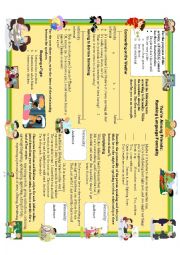
|
Introducing Formal/Informal Language
Introduce your students to language changes for different situations and relationships. Ask them to describe each picture--a situation or relationship. Guide them in ranking the formality of the situation or identifying the relationship between the people based on the language that is used. Then practice using different varieties of language with r...
Level: intermediate
Age: 10-17
Type: worksheet
Downloads: 274
|
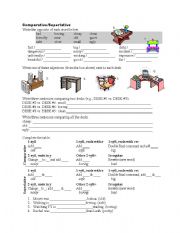
|
Comparative/Superlative Worksheet
Students work from dependent to slightly freer practice, completing a table with the appropriate forms for normal and irregular forms, write the opposite of adjectives, and complete another table on spelling changes; write sentences using the most appropriate comparative or superlative forms based on general knowledge and pictures. *Images from Mic...
Level: elementary
Age: 10-17
Type: worksheet
Downloads: 72
|
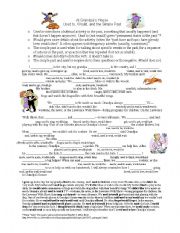
|
At Grandpa�s House: Used to, would, and simple past
A description with options for the past.
Level: intermediate
Age: 10-17
Type: worksheet
Downloads: 71
|
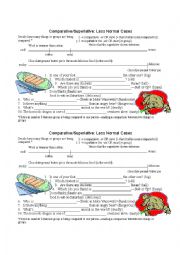
|
Comparative/Superlative--unusual cases
I noticed that my English textbook expected students to use the comparative and superlative in some unusual cases--with and without "than," with comparison of a group to one person, with -ly adjectives, and so on. So I developed this practice sheet to help students notice these unusual cases.
Answers: bigger, older/oldest (depends on the context)...
Level: elementary
Age: 11-17
Type: worksheet
Downloads: 58
|
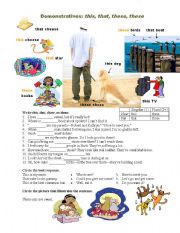
|
Demonstratives: This, that, these, those
Pictures and a table show the meaning/use of this, that, these, and those. One exercise allows students to give the correct form, while another asks students to show they understand the meaning by (a) choosing the best response and (b) selecting the corresponding picture.
Level: elementary
Age: 8-17
Type: worksheet
Downloads: 56
|
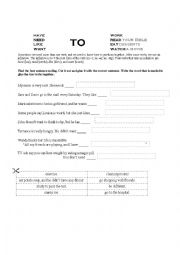
|
Like to, want to, need to, have to
Students will learn to use the infinitive form to add another verb after the verbs "like," "want," "need," and "have" by (1) literally cutting and pasting the second half of the sentence and (2) writing the word "to" on the line. I have provided dotted lines to avoid students pasting the sentence completion words over the space for "to." This works...
Level: elementary
Age: 8-17
Type: worksheet
Downloads: 47
|
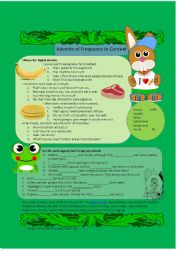
|
Adverbs of Frequency, Practice in Context
In the first exercise, students choose the most logical response based on the frequency adverb used in the sentence. In the second, students supply the appropriate frequency adverb based on the context supplied.
Level: elementary
Age: 12-100
Type: worksheet
Downloads: 40
|
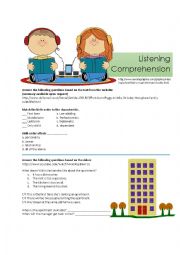
|
5 Listening Activities or Tests
Use for class work or tests! I developed these questions to assess students� listening ability during a high school conversation course for students who had been in a bilingual school and were almost fluent. (I took my scope and sequence/content sequence from Cambridge�s photocopiable Listening Extra and Compelling Conversations, which the students...
Level: advanced
Age: 12-100
Type: activity-card
Downloads: 39
|
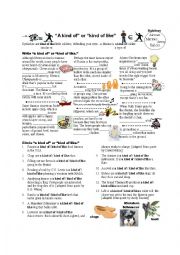
|
Kind of Like, A Kind of
I developed this worksheet to provide extra practice for Touchstone, Level 1, Unit 9. Editable
Level: elementary
Age: 12-17
Type: worksheet
Downloads: 39
|
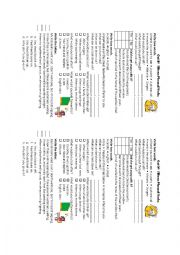
|
15 Phrasal Verbs
This worksheet provides practice for the 15 phrasal verbs introduced in the poster given at http://www.grammar.net/phrasalverbs
Level: intermediate
Age: 12-100
Type: worksheet
Downloads: 29
|
|
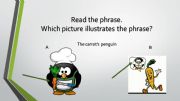
Family, Possessive Adjectives, Part B
Help your students internalize the word order for English possessive adjectives with processing instruction exercises!
Level: elementary
Age: 8-100
Downloads: 23
|

Family, Possessive Adjectives, Part A
Help your students learn the English word order with possessives through processing instruction exercises.
Level: elementary
Age: 8-100
Downloads: 22
|

Family, Possessive Adjectives, Part C
Help your students learn the English word order to use with possessives (assimilating the difference between my mom�s dad and my dad�s mom). I divided the presentation into three parts because the instructions said the max. size was 2MB.
Level: elementary
Age: 8-100
Downloads: 19
|

Review of Units 7-8 (Infinitives, clauses of time)
Original exercises as review for Interchange Level 2, Units 7-8
I�ve removed the images to meet the size limit requirement
Level: intermediate
Age: 13-100
Downloads: 11
|
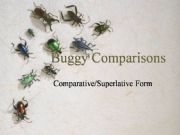
Buggy Comparisons
Cheerful (free Microsoft clipart) bugs illustrate comparisons using both the comparative and superlative forms. There is first an explanation of the rules for comparative and superlative, then several examples of each and then extra practice for the student.
Level: elementary
Age: 10-17
Downloads: 6
|
|
|